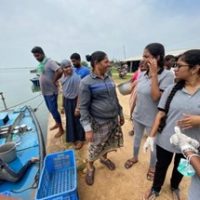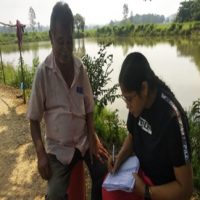Raising Awareness on Sustainable Fishing Practices
Centurion University of Technology and Management, as part of its dedication to sustainable fisheries and protecting the environment, actively conducts educational outreach efforts for local and national communities since 2017-18. These initiatives aim to educate people about the problems of overfishing, illegal and unreported fishing, and harmful fishing methods.
Students from the school work closely with local fish farmers, guiding them on the best ways to manage fisheries as part of their overall development.
Fishing Camps
Additionally, the University arranges camps where students interact with local communities, especially fishermen. These camps are a way to teach the local fishermen about the bad effects of overfishing, unregulated fishing, and harmful practices like blast fishing and bottom trawling. They also talk about the dangers of using cyanide in fishing. The faculty also takes part in these interactions, answering questions and discussing how to add value to less valuable fish and why it’s important to have fishing breaks during certain times.
Preserving Mangroves for Sustainable Fisheries
Furthermore, the University organizes programs to raise awareness among regional fishermen, with a focus on saving important ecosystems.
For example, Odisha’s Bhitarkanika Indian Wildlife Sanctuary stands as the second largest mangrove habitat in India, sprawling across a vast 672 sq. km area. Located near the Bay of Bengal, the region’s soil is rich in salts and minerals, fostering a flourishing tropical and subtropical ecosystem. Within Bhitarkanika Sanctuary, endangered saltwater crocodiles find a safe haven, utilizing the area as a vital breeding ground. Along its eastern edge lies Gahirmatha Beach, boasting the world’s largest colony of Olive Ridley Sea Turtles. This sanctuary’s core region has been designated as a National Park, spanning 145 square kilometers and serving as a sanctuary of unparalleled biodiversity.
During our visits to Bhitarkanika, our students and faculty actively engage with the local community, particularly the youth and fishermen, sharing knowledge about the significance and conservation of mangroves and their diverse ecosystems. These interactions occur periodically, with our team reaching out to the locals once every two months, fostering awareness and understanding about the importance of preserving this unique habitat. This effort aims to highlight the significance of protecting these vital habitats and the creatures that rely on them.
These ongoing activities show the University’s commitment to spreading awareness and promoting responsible and sustainable fishing practices. They help in conserving aquatic ecosystems and preventing overfishing, illegal fishing, and harmful fishing practices.


